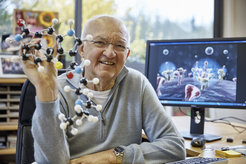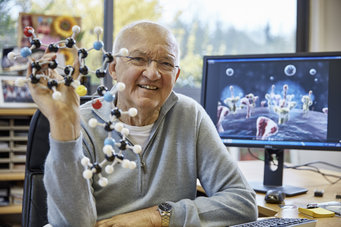Stopping cancer at the root: Axel Ullrich named European Inventor Award 2017 finalist
Cancer remains one of the leading causes of death worldwide and the World Health Organisation projects over 13 million annual deaths from cancer by the year 2030. A new generation of medicines based on genetic engineering stops cancer at the root, by disrupting the blood supply or the growth of tumours. Key insights behind this new approach are owed to German molecular biologist Axel Ullrich (73). In a research career spanning over four decades, the pioneer identified the cellular processes behind the genesis of cancer and other diseases. In commercial drug development roles and as a leading Max Planck Institute researcher, Ullrich spearheaded ground-breaking laboratory techniques and next-generation anti-cancer medicines. For these achievements, Axel Ullrich has been nominated for the European Inventor Award 2017 as one of three finalists in the category "Lifetime Achievement". The winners of the 12th edition of the European Patent Office (EPO)’s annual innovation prize will be announced at a ceremony in Venice on 15 June.

"Axel Ullrich is a true pioneer in the field of genetics and has forever changed the scientific understanding of diseases such as cancer, and improved patient outcomes with his next-generation treatments," said EPO President Benoît Battistelli announcing the European Inventor Award 2017 finalists. "As an advocate of translating research breakthroughs into benefits for society, Ullrich has developed successful drugs for some of the leading pharmaceutical companies, and founded several start-ups with his inventions."
Respected as an international authority in his field, the pioneer started his career on a strong footing when only two years after earning his PhD in molecular genetics from the University of Heidelberg in 1975 he became the world's first scientist to transfer a copy of the human insulin gene into bacteria in 1977. This breakthrough spawned the first genetically engineered drug, recombinant human insulin, in 1982. Further career milestones include the discovery of a particular gene that causes breast cancer, known as HER2, which Ullrich then successfully targeted with a genetically engineered drug. Further expanding the arsenal of cancer-fighting medications, he also identified the mechanisms by which tumours secure their blood supply and stunted their growth with a "tumour starving" drug.
Engineering the building blocks of life
Human DNA was still predominantly uncharted territory when Ullrich became one of the first employees at California-based biotech company Genentech in 1978. Armed with the tools for altering genetic code on a molecular level, the scientist pursued a new path by investigating the signal transduction of cells, the processes by which cells in the human body communicate. Applying his approach to cancer research, he found that instead of poisoning cancer with aggressive chemicals or exposing patients to harmful radiation, there was a more elegant way. His key discoveries into "oncogenes" – the genes involved in the formation of cancers – helped Ullrich identify the "off switches" that stop cancer at the root. Accordingly, Ullrich's tumour-starving medications work by "silencing" specific cellular signalling processes, including so-called protein tyrosine kinase (PTK) gene transcripts. His anti-breast cancer drug stops the multiplication of HER2-positive cancer cells by "jamming" the reception of cell signals that activate their growth.
Stopping diseases at the root
The world needs new approaches to treat cancer. By 2030, the International Agency for Research on Cancer expects up to 22.2 million new cases per year, a 75% increase from 2008. The medical model known as "personal medicine" holds promise for new treatments by replacing one-size-fits-all solutions with targeted medicines, matched to patients' genetic profiles. Axel Ullrich has played a major role in initiating a new, targeted approach to cancer therapy. In women whose tumours express the HER2 oncogene, Ullrich's anti-breast cancer drug Herceptin – which was the first-ever specific anti-cancer drug and lauded as a breakthrough on its launch in 1998 – has been found to decrease tumour recurrence by 50%. The inventor is supporting the search for similar genetic markers for cancers through global research initiatives such as the Singapore Oncogenome Project.
As a key driver behind personal medicine, genetic testing is becoming more widely available: Today, laboratories can routinely order DNA tests for under EUR 500 per patient. Patients that test positive for certain genetic markers now benefit from targeted therapies with unprecedented efficacy. Treatments such as Ullrich's tumour-starving drug Sunitinib (used for treatment of intestinal and kidney cancer) also present much-needed alternatives to chemotherapy and radiation that can take a high toll on patient health.
Ullrich attributes his research success to trusting his gut feeling whenever important decisions have to be made: “Always follow your instincts,” the inventor says. “Making rational decisions about your life never works.”
Champion of turning research into life-saving applications
Axel Ullrich has always emphasised the importance of bridging the gap between laboratory and clinical practice. His genetics-based treatments have single-handedly created a thriving segment on the EUR 72 billion per year world market for cancer drugs. So-called kinase inhibitor drugs for treating cancer – the field pioneered by Ullrich – are expected to net approximately EUR 29 billion annually (USD 31 billion) by 2019. Drugs based on his patented inventions have become blockbuster pharmaceuticals: Herceptin ranked among the top-50 medications with annual sales of up to EUR 6.3 billion (USD 6.7 billion) per year for patent licensee Genentech before the patent expired in 2014. Sunitinib, marketed by Pfizer, is poised to generate annual sales up to EUR 1.5 billion (USD 1.6 billion) by 2018. Ullrich also founded numerous successful start-ups to bring his inventions to market, including Sugen (purchased by Pfizer), Axxima Pharmaceuticals (now GPC Biotech AG), U3 Pharma (now Daiichi Sankyo Company Limited), Kinaxo Biotechnologies GmbH (now part of Evotec AG) and Blackfield AG. He is also an avid supporter of global research initiatives.
Ullrich is listed as inventor on well over 100 patents filed worldwide and 30 European patents. A prolific author of over 570 scientific publications, he ranks among the ten most-cited scientists of the past 25 years with at least 50 000 citations. His scientific achievements have earned him some of the world's highest honours, including the Robert Koch Prize (2001), the Clifford Prize for Cancer Research (2005), the Hamdan Award for Medical Research Excellence (2008) and the Wolf Prize in Medicine (2010). He is one of twelve scientists inducted into the German Research Hall of Fame.
And despite the commercial – and clinical – success of his medications, Ullrich's heart remains in science. Since 1988, he has continued his lifelong research path as the director of the Molecular Biology department at the Max Planck Institute of Biochemistry in Martinsried, Germany. Fighting cancer has become Ullrich's ongoing challenge for the past 30 years: “Cancer is such a huge problem. It has to be defeated,” Axel Ullrich said in a 2011 interview.












